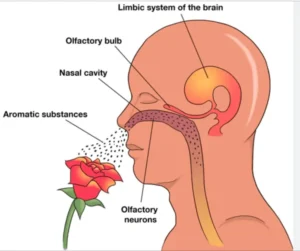The word Aromatherapy is a combination of two words Aroma meaning ‘smell‘ and therapy meaning ‘treatment‘.
What is Aromatherapy?
Aromatherapy is a natural process that uses essential oil as the main therapeutic reagent to heal person’s mind, body and soul. Essential oils are mixture of saturated and unsaturated hydrocarbons, alcohols, aldehydes, esters, ethers, ketones, oxides, and terpenes which may produce characteristic odours. they are extracted from flowers, leaves, fruits, roots.
How aromatherapy works?
When essential oils are inhaled by someone, the scent molecules present in these essential oils travel from olfactory nerves to limbic and hypothalamus parts of brain via olfactory bulb. These signals cause brain to release chemicals like serotonin, endorphin etc, to provide a feeling of relief. For example; Serotonin is released by inhaling Calming oil and Endorphin chemical is released from Euphoric oil.

Plants producing essential oils:
Lemon oil, Sweet-orange oil – Extracted from fruit peel of their plants
Cinnamon oil – Extracted from bark of cinnamon plant
Lemon-grass oil – Extracted from leaves of lemon grass plant
Ginger oil – Extracted from Roots of Ginger
Rosemary oil – Extracted from entire plat of Rosemary
Jasmine oil, rose oil – Extracted from flowers of their plants
Classification Of Aromatherapy:
1) Cosmetic Aromatherapy:
Essential oils are used in skin, body, face, and hair cosmetic products which bare being used for various purposes like cleansing, moisturizing.
2) Massage Aromatherapy:
You have to use grape seed oil, almond oil, in vegetable oil during massage for wonderful effects and this procedure is known as healing touch of massage aromatherapy .
3) Olfactory Aromatherapy:
Inhalation of aromatherapy has given rise to olfactory aromatherapy, which causes emotional wellness, calmness, relaxation of human body and mind.
4) Psycho Aromatherapy:
In this type of aromatherapy, certain states of moods and emotions can be obtained by inhalation of these essential oils which gives the feeling of pleasure to patients.
How Aromatherapy can help you?
Benefits of aromatherapy by using plants are as follows:
Some plants for treating problems:
Essentials oil extracted from plants to treat common humans problems are discussed below:
i) Clary sage:
It belongs to the family of laminaceae. Purple tinted large hairy green leaves are the main source of essentials oil in Clary sage.
- It is a boon for a women as its tonic is used for womb and uterus associated problems.
- It also regulates menstrual periods ease tension and muscles cramps.
- It helps in controlling sebum production hence, can be used for both oily and dry skin along with acne and wrinkles.
ii) Eucalyptus:
- Its oils have been used to regulate and activate various system like nervous system in conditions of headache, neuralgia etc.
- Its helps immune system to boosts immunity against flu, cold, and chicken pox.
- Moreover skin problems like wounds, cuts, burns, insect bites can be treated with it and is also used in the treatment of muscles and joints pain.
iii) Lemon:
- Its oil brightens the dull skin.
- Boost the immune system and accelerates the white corpuscels production along with reducing acidity and ulcer by forming carbonates and bicarbonates of calcium and potassium.
iv) Rosemary:
- Its oil has a marked action on the digestive system by relieving the symptoms of indigestion, constipation etc.
- In winter it is use to relief rheumatic pain which become severe due to cold.
- Its oil stimulant for the scalp encouraging hair growth and providing treatment for dandruff and greasy hair.
v) Tea Tree:
The main constituent of its oil is terpinen-4-ol which is immune booster.
- The oil is used in herpes acne, burns, insects bites dandruff etc.
- It is use for the treatment of TB, cough, asthma and whooping cough.
- It is used by female for cystitis and pruritus treatment.
What are the side effects of Aromatherapy?
Although this technique is most effective but it has some side effects which are given below:
- Eye, mucous membrane , skin itching and sensitization to oils containing aldehydes and phenols.
- Allergic reactions have been reported.
- Reversible Prepubertal gynecomastia was reported on exposure to lavender and tea tree oil.